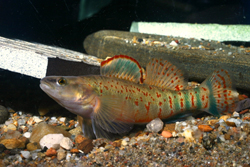Front Porch Blog
By Madison Hinshaw, Communications Editorial Intern in Spring 2012.
We’ve known for a long time that mountaintop removal is affecting Appalachian creatures. This time it’s a fish found in the Appalachian streams and rivers — the Kentucky arrow darter.
This fish, found only in Kentucky, is one of the top 10 U.S. species most threatened by fossil fuel development, according to a report released by the Endangered Species Coalition.
The darter thrives in the shallow waters of the upper Kentucky River Basin, where most of the state’s coal mining takes place. The darter was once found in 68 streams throughout Kentucky but it is now only found in 33.
The filth — mountaintop removal mining pollution — that coal companies are putting into the waters is burying these fish alive, along with impacting other wildlife. Humans are also dealing with more and more health issues like cancer and birth defects that have been linked to the erosion and toxins polluting the Appalachian streams.
This fish is a part of a grand habitat. It feeds on the many aquatic insects found on the banks of these streams, while birds, amphibians and other fish feed on the darter. This habitat is being skewed by the decreasing amount of darters throughout the region. Protecting the darter not only benefits this one particular habitat, but ultimately aids in the clean up of the headwaters in Kentucky making them safer to drink.
But unfortunately, this is not a perfect world of instant gratification.
In 2010, the Kentucky arrow darter became a candidate for Endangered Species Act protection, which means that it is on a federal waiting list. In a legal settlement between the Center of Biological Diversity and the U.S. Fish and Wildlife Service, the darter will be considered for protection in 2015.
Mountaintop removal has already destroyed more than 500 mountains, 1 million acres of hardwood forests and 2,000 miles of streams throughout Appalachia.
One may ask how protecting a single species of fish can put a stop to mountaintop removal, but just remember what Neil Armstrong said, “One small step for man, one giant leap for mankind.”
PREVIOUS
NEXT
Related News

Leave a comment
Your email address will not be published. Required fields are marked *

